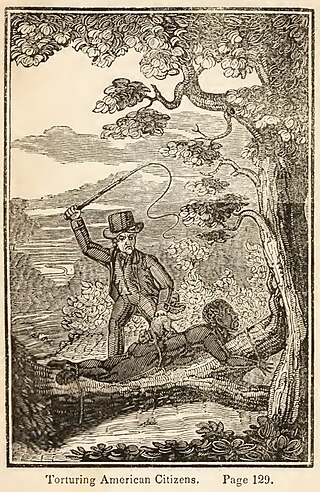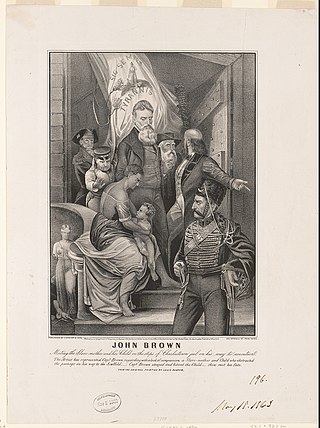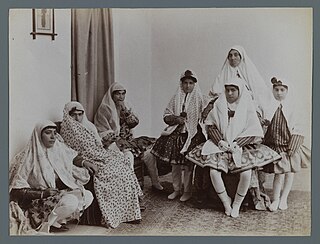Sexual slavery may refer to:
Sexual slavery may refer to:

Concubinage is an interpersonal and sexual relationship between two people in which the couple does not want, or cannot, enter into a full marriage. Concubinage and marriage are often regarded as similar, but mutually exclusive.

Sexual slavery and sexual exploitation is an attachment of any ownership right over one or more people with the intent of coercing or otherwise forcing them to engage in sexual activities. This includes forced labor that results in sexual activity, forced marriage and sex trafficking, such as the sexual trafficking of children.

The legal institution of human chattel slavery, comprising the enslavement primarily of Africans and African Americans, was prevalent in the United States of America from its founding in 1776 until 1865, predominantly in the South. Slavery was established throughout European colonization in the Americas. From 1526, during the early colonial period, it was practiced in what became Britain's colonies, including the Thirteen Colonies that formed the United States. Under the law, an enslaved person was treated as property that could be bought, sold, or given away. Slavery lasted in about half of U.S. states until abolition in 1865, and issues concerning slavery seeped into every aspect of national politics, economics, and social custom. In the decades after the end of Reconstruction in 1877, many of slavery's economic and social functions were continued through segregation, sharecropping, and convict leasing.

"Children of the plantation" is a euphemism used to refer to people with ancestry tracing back to the time of slavery in the United States in which the offspring was born to black African female slaves in the context of the trans-Atlantic slave trade and European men, usually the slave's owner, one of the owner's relatives, or the plantation overseer. These children were often considered to be the property of the slave owner and were often subjected to the same treatment as other slaves on the plantation. Many of these children were born into slavery and had no legal rights, as they were not recognized as the legitimate children of their fathers. This practice was a form of sexual abuse and exploitation, as the European men who fathered these children often used their power and authority to force themselves upon the black females who were under their control. The trauma and suffering that these children and their mothers experienced as a result of this practice continue to have a lasting impact on the African American community.

Islamic views on slavery represent a complex and multifaceted body of Islamic thought, with various Islamic groups or thinkers espousing views on the matter which have been radically different throughout history. Slavery was a mainstay of life in pre-Islamic Arabia and surrounding lands. The Quran and the hadith address slavery extensively, assuming its existence as part of society but viewing it as an exceptional condition and restricting its scope. Early Islamic dogma forbade enslavement of dhimmis, the free members of Islamic society, including non-Muslims and set out to regulate and improve the conditions of human bondage. Islamic law regarded as legal slaves only those non-Muslims who were imprisoned or bought beyond the borders of Islamic rule, or the sons and daughters of slaves already in captivity. In later classical Islamic law, the topic of slavery is covered at great length.

In BDSM, Master/slave, M/s or sexual slavery is a relationship in which one individual serves another in a consensual authority-exchange structured relationship. Unlike Dominant/submissive structures found in BDSM in which love is often the core value, service and obedience are often the core values in Master/slave structures. The participants may be of any gender or sexual orientation. The relationship uses the term "slave" because of the association of the term with ownership rights of a master to their slave's body, as property or chattel. While male "masters" will usually be referred to as "Master", whether or not female Masters are referred to as "Master" or "Mistress" may depend upon whether they identify as following the leather subculture or BDSM path, or simply preference.

The continent of Africa is one of the regions most rife with contemporary slavery. Slavery in Africa has a long history, within Africa since before historical records, but intensifying with the trans-Saharan and Indian Ocean slave trade and again with the trans-Atlantic slave trade; the demand for slaves created an entire series of kingdoms which existed in a state of perpetual warfare in order to generate the prisoners of war necessary for the lucrative export of slaves. These patterns persisted into the colonial period during the late 19th and early 20th century. Although the colonial authorities attempted to suppress slavery from about 1900, this had very limited success, and after decolonization, slavery continues in many parts of Africa despite being technically illegal.

The Bible contains many references to slavery, which was a common practice in antiquity. Biblical texts outline sources and the legal status of slaves, economic roles of slavery, types of slavery, and debt slavery, which thoroughly explain the institution of slavery in Israel in antiquity. The Bible stipulates the treatment of slaves, especially in the Old Testament. There are also references to slavery in the New Testament.

Contemporary slavery, also sometimes known as modern slavery or neo-slavery, refers to institutional slavery that continues to occur in present-day society. Estimates of the number of enslaved people today range from around 38 million to 49.6 million, depending on the method used to form the estimate and the definition of slavery being used. The estimated number of enslaved people is debated, as there is no universally agreed definition of modern slavery; those in slavery are often difficult to identify, and adequate statistics are often not available.

Human trafficking is the trade of humans for the purpose of forced labour, sexual slavery, or commercial sexual exploitation. Human trafficking can occur within a country or trans-nationally. It is distinct from people smuggling, which is characterized by the consent of the person being smuggled.

Slave breeding was the practice in slave states of the United States of slave owners to systematically force the reproduction of slaves to increase their profits. It included coerced sexual relations between male slaves and women or girls, forced pregnancies of female slaves, and favoring women or young girls who could produce a relatively large number of children. The objective was to increase the number of slaves without incurring the cost of purchase, and to fill labor shortages caused by the abolition of the Atlantic slave trade.

Military brothels were set up by Nazi Germany during World War II throughout much of occupied Europe for the use of Wehrmacht and SS soldiers. These brothels were generally new creations, but in the west, they were sometimes expansions of pre-existing brothels and other buildings. Until 1942, there were around 500 military brothels of this kind in German-occupied Europe, serving travelling soldiers and those withdrawn from the front. According to records, a minimum of 34,140 European women were forced to serve as prostitutes during the German occupation of their own countries along with female prisoners of concentration camp brothels. In many cases in Eastern Europe, teenage girls and women were kidnapped on the streets of occupied cities during German military and police round ups called łapanka in Polish or rafle in French.
Islam and slavery may refer to:
Exploitation may refer to:

The treatment of slaves in the United States often included sexual abuse and rape, the denial of education, and punishments like whippings. Families were often split up by the sale of one or more members, usually never to see or hear of each other again.

Quasi-state-level jihadist groups, including Boko Haram and the Islamic State of Iraq and the Levant, have captured and enslaved women and children, often for sexual slavery. In 2014 in particular, both groups organised mass kidnappings of large numbers of girls and younger women.

Concubinage in the Muslim world was the practice of Muslim men entering into intimate relationships without marriage, with enslaved women, though in rare, exceptional cases, sometimes with free women. If the concubine gave birth to a child, she attained a higher status known as umm al-walad.

In classical Islamic law, a concubine was a slave-woman with whom her master engaged in sexual relations. Concubinage was widely accepted by Muslim scholars in pre-modern times. Most modern Muslims, both scholars and laypersons, believe that Islam no longer accepts concubinage and that sexual relations are religiously permissible only within marriage.

Open slavery existed in Kuwait until the 1940s. Slavery was formally abolished in Kuwait in 1949. In practice, slavery was not actually abolished as such, but the law no longer recognized it after 1949, which meant that every slave who applied for manumission was guaranteered to be freed. Many members of the Afro-Arabian minority are descendants of the former slaves. Slavery of people from Africa and East Asia was succeeded by the modern Kafala system of poor workers from the same region were slaves had previously been imported.

Open slavery existed in Bahrain until the 1930s. Slavery was formally abolished in Bahrain in 1937. Slavery ended earlier in Bahrain than in any other Gulf state, with the exception of Iran and Iraq. Many members of the Afro-Arabian minority are descendants of the former slaves. Slavery of people from Africa and East Asia was succeeded by the modern Kafala system of poor workers from the same region were slaves had previously been imported.